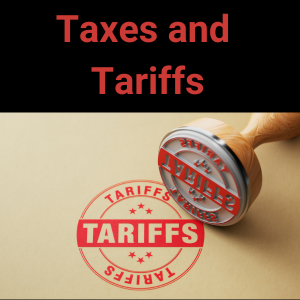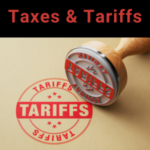
We know what you’re thinking. This is another dry, boring podcast on a topic that we know nothing about. Well, I hope we’ll be able to surprise you and that you’ll learn lots of vocabulary connected to taxes and tariffs in this episode.
Voice message from Jose from Asturias
English is ‘a must’
Sometimes I hate English /h/
Being/getting angry https://inglespodcast.com/347
TAXES and TARIFFS
Different types of taxes
“Only two things are certain in life. Death and taxes.” – Benjamin Franklin
VAT value added tax
Social Security Contributions
Income tax (personal and corporate)
Capital Gains Tax: On profits from selling assets like property or stocks. Property Taxes/Real Estate Tax: Paid annually on property ownership. Stamp Duty / Transfer Tax: On property purchases or legal documents. Inheritance/estate tax (except if you live in Norway, Portugal or Sweden)
Excise Duties (Special Consumption Taxes) On specific goods like: alcohol, tobacco, fuel and luxury products
Carbon tax or emissions tax
Vehicle registration tax
Local business taxes (eg. tourism tax on hotel stays)
Some more vocabulary
To do your taxes (UK) / To file your taxes (US)
To submit a tax return
To cook the books – alter a company’s true figures illegally for financial purposes
To get/ask for a tax rebate or tax refund
Tax relief – a reduction in tax owed, often for specific expenses
Tax evasion – illegally avoiding tax
Tax avoidance – legally minimising tax, often through loopholes
Gross income – total income before tax
Taxable income – income which is liable to tax
Tax deductible – expenditure that can be deducted from total taxable income
Net income – income after tax
Audit – review of financial records by tax authorities
A trade war – a situation in which countries try to damage each other’s trading power, by introducing high tariffs, for example.
Tariffs
Tariffs are taxes placed on imported goods—in other words, they are charges that a government applies when goods enter a country from abroad.
What’s the purpose of imposing tariffs?
Raise government revenue (but only if people continue buying the more expensive imported product).
Protect domestic industries by making imported goods more expensive.
Influence trade policy and negotiations.
What’s the difference between tariffs and customs duties?
They’re often used interchangeably.
“Tariff” usually refers to the rate of tax.
“Customs duty” refers to the actual tax paid on imported goods.
Discussion Some argue that tariffs benefit domestic workers by protecting local industries. Do you agree?
Can tariffs ever be considered a positive policy tool for a country’s economy?
…and now it’s your turn to practise your English.
Send us a voice message. https://www.speakpipe.com/inglespodcast
Send us an email with a comment or question to [email protected] or [email protected]
If you’re a Spanish speaker and you want to improve your English with free and paid resources, visit the mansioningles website at mansioningles.com and for paid products you can browse the online store at https://store.mansioningles.net/
Thank you to our Patreon supporters. Join our Patreon program and you get instant access to the transcriptions of this podcast and live Zoom chats so that you can practice speaking. https://www.patreon.com/inglespodcast
Welcome to our new Patreon supporters who have joined us this month:
Javier Toro
If you enjoyed this podcast, please tell your friends.
The music in this podcast is by Pitx. The track is called ‘See You Later’




